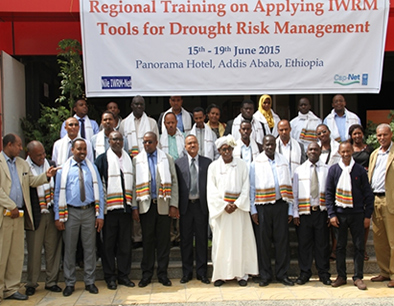The training was officially opened by the Ethiopian State Ministerfor Water, Irrigation, and Energy, Honorable Kebede GerbaWater, Irrigation, and Energy State Minister Kebede Gerba who stressedthat integrated water resources management resources is key to minimize the impact of drought in the East African sub- region resulting from climate.
“The development of water requires an integrated water resources management as a key tool to sustainable and equitable utilization of the resources under the emerging pressure of pervasive poverty, rapid population and climate change”, Kebede added.
The training was attended by 30 participants from various institutions within IGAD/Nile region working in the area of water, climate change and disaster management.
The training was supported with training material on Drought Risk Management developed by Cap-Net, practical exercises and case studies.
The Ugandan Commissioner for Water Resources Planning and Regulation and Capacity Building Coordinator in the Nile Basin (Nile IWRM Net), Dr. Callist Tindimugaya, stated that the workshop focused on how to apply integrated water resources management and harmonize each respective member countries water resource policies in order to jointly address climate driven droughts in the IGAD/Nile region.
“Each member state has the policy to address the challenges” Tindimugaya said, adding “IGAD countries will look at how to update these water policies to address the issues of integrated water resource and drought risk management.”
In addition, the training enabled participants:
- To have increased knowledge and understanding of drought risk management frameworks
- To gain knowledge and appreciation of how to address climate change/drought issues within the framework of IWRM
To identify opportunities and best practices for adapting to climate change and drought resilience through applying an IWRM approach
